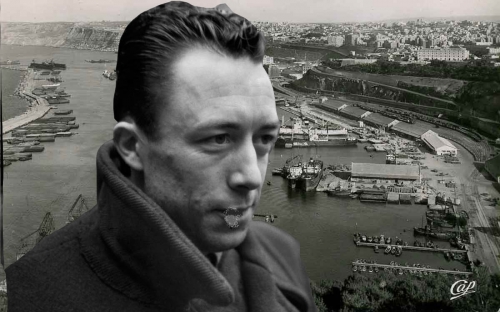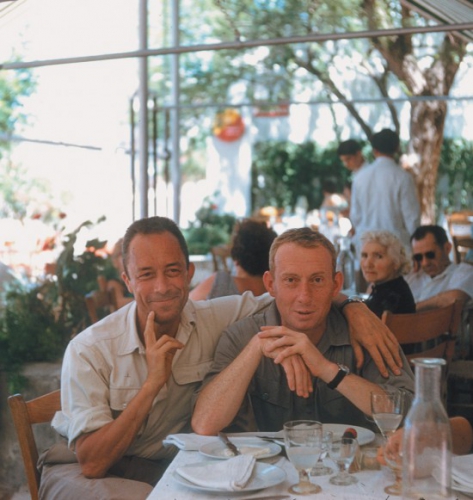lundi, 20 avril 2015
Camus on Ideology vs. Blood

Camus on Ideology vs. Blood
By Kevin Donoghue
Ex: http://www.counter-currents.com
It is December 10, 1957, and a cold, dark day in Stockholm, Sweden. Inside the hall, however, it is bright and warm, with many of the world’s leading men assembled for the chance to hear directly from the bright young man about to be honored. His voice has rung out as a sign of hope and a challenge to tyrants and dictators, his work acclaimed and already achieving a place of honor in the curricula of the world’s universities.
The author has just turned 44 years of age, yet he has the ear of the world’s great and good, as well as the ears of many a common man. His life’s work as an author has led to today’s event, the awarding of the Nobel Prize, but he is more than that: a famous newspaper editor, a philosopher, a public intellectual, a dramatist, a playwright, a playboy whose Hollywood good-looks and fame ensure a dizzying succession of women. For a time, he was the voice of the French Resistance inside France itself—indeed, from the very heart of immortal Paris—both during and immediately after the war.
Yet, on this day, many find themselves wondering what this famous man will say. He has been uncommonly quiet for months now, a matter that has incited not a small amount of public comment. The author did rouse himself during the Hungarian Uprising of 1956 and helped rally world opinion in favor of that noble but doomed effort to remove the ancient and Christian nation of Hungary from under Soviet domination. Yet, he has remained silent in the face of a national crisis gripping his own homeland.
In Algeria, French troops are fighting a no-holds-barred war against Muslim forces seeking to evict France and all Frenchmen and Christians. In Paris, all men with an interest in public affairs have staked a position on what would eventually be known as the Algerian War, a matter so dire, so central to French life as to eventually cause not just the downfall of a government but the demise of the Fourth Republic itself.
And, so, the men in Stockholm that day were more than usually interested when the honored man, Albert Camus, took to the podium to give a short lecture. And so he began:
In receiving the distinction with which your free Academy has so generously honored me, my gratitude has been profound, particularly when I consider the extent to which this recompense has surpassed my personal merits. Every man, and for stronger reasons, every artist, wants to be recognized. So do I. But I have not been able to learn of your decision without comparing its repercussions to what I really am. A man almost young, rich only in his doubts and with his work still in progress, accustomed to living in the solitude of work or in the retreats of friendship: how would he not feel a kind of panic at hearing the decree that transports him all of a sudden, alone and reduced to himself, to the center of a glaring light? And with what feelings could he accept this honor at a time when other writers in Europe, among them the very greatest, are condemned to silence, and even at a time when the country of his birth is going through unending misery? (http://www.nobelprize.org/nobel_prizes/literature/laureates/1957/camus-speech.html [2])
The lecture matched the man: short yet grand, concise yet breath-taking in scope.
However, fate would have it that Camus’ speech would not be the most famous, or the most important, words he would utter that day. For a controversy dogged his every step in Sweden. A French Algerian writer, a celebrated man of the French Left, could not be allowed to say nothing about what his comrades considered a war of national liberation that demanded their full support. So after Camus’ remarks, an Algerian student rose and asked the newly-crowned laureate, how he could remain silent in the face of his people’s struggle for justice.
And, so, Camus responded. His response confounded his comrades and revealed the extent to which Camus prized the reality of our organic connections to family and community over mere political theory and rhetoric.
People are now planting bombs on the tramway of Algiers. My mother might be on one of those tramways. If that is justice, then I prefer my mother.
That simple remark turned a simmering controversy into a firestorm of condemnation, a condemnation so furious as to—temporarily, at least—besmirch his reputation and cause the removal of his works from mandatory reading lists well into the 1980s.

Camus and Michel
Gallimard from 1958
Those of us on the Right who are seeking both to describe the terminal problem of liberalism and to set forth a humane solution would do well to remember Camus’ point.
To be effective, to signal clearly that we are not haters and harmers, but people offering a just and humane solution to a very real, very human problem, we must remember that abstract political theories are outside of our political tradition. (They are not outside of France’s, hence, Camus’ heresy.) We must remain grounded. We must recognize why the Left writ large continues to attract souls like Camus, and we must offer an equally attractive alternative vision.
In short, let us appeal to family, not theory.
Article printed from Counter-Currents Publishing: http://www.counter-currents.com
URL to article: http://www.counter-currents.com/2015/04/camus-on-ideology-vs-blood/
URLs in this post:
[1] Image: https://secure.counter-currents.com/wp-content/uploads/2014/06/camus.jpg
[2] http://www.nobelprize.org/nobel_prizes/literature/laureates/1957/camus-speech.html: http://www.nobelprize.org/nobel_prizes/literature/laureates/1957/camus-speech.html
[3] Image: http://www.counter-currents.com/wp-content/uploads/2015/04/messud_1_110713-e1429032863954.jpg
00:05 Publié dans Littérature | Lien permanent | Commentaires (0) | Tags : albert camus, littérature, lettres, lettres françaises, littérature française |  |
|  del.icio.us |
del.icio.us |  |
|  Digg |
Digg | ![]() Facebook
Facebook



Les commentaires sont fermés.